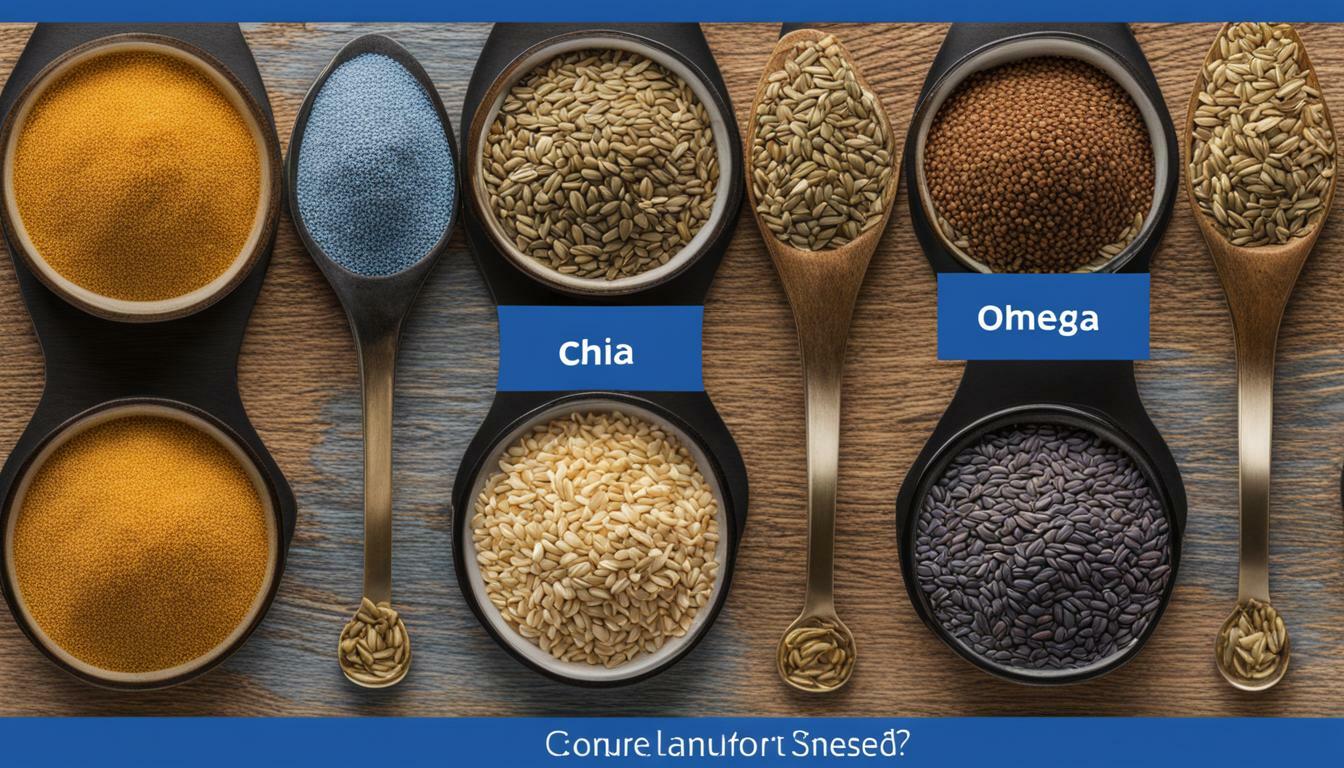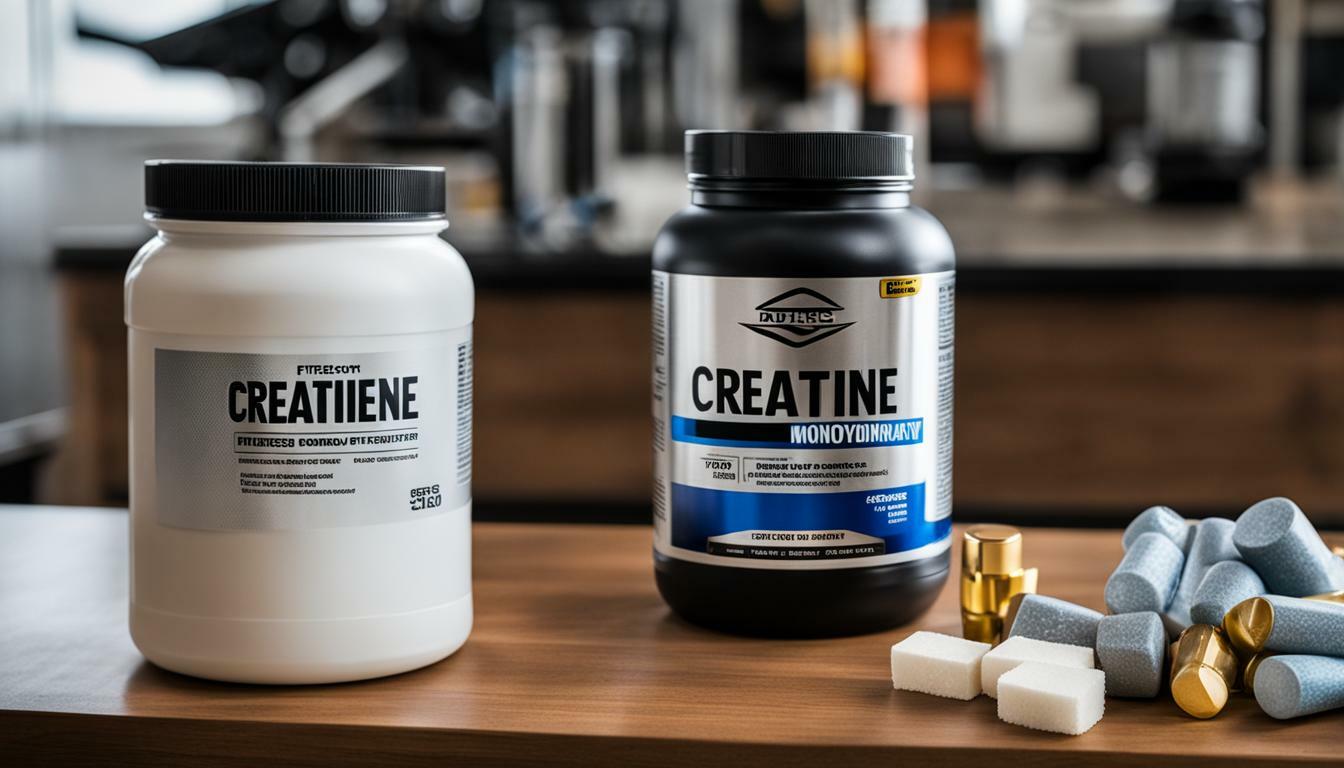CoQ10 and ubiquinol are two forms of a compound that plays a crucial role in energy production and act as antioxidants in the body. CoQ10, also known as coenzyme Q10, is a vital component in the production of adenosine triphosphate (ATP), the molecule that provides energy to our cells. It exists in two forms: ubiquinol and ubiquinone.
Ubiquinone is the oxidized form of CoQ10 and is commonly found in commercial supplements. On the other hand, ubiquinol is the reduced form and is converted from ubiquinone after consumption. Both forms function as electron carriers in the process of ATP production and also have antioxidant properties to protect against cellular damage.
Key Takeaways:
- CoQ10 and ubiquinol are two different forms of the same compound essential for energy production.
- Ubiquinone is the oxidized form of CoQ10, while ubiquinol is the reduced form.
- Both CoQ10 forms act as electron carriers in ATP production and have antioxidant properties.
- Research suggests that ubiquinol supplementation may increase CoQ10 levels more effectively in some individuals.
- It is recommended to choose ubiquinol supplements due to their higher bioavailability.
CoQ10 and Ubiquinol: Exploring their Roles
CoQ10 and ubiquinol are essential compounds that play a key role in the body’s metabolic energy production. CoQ10, also known as coenzyme Q10, is a compound that exists in two forms: ubiquinone and ubiquinol. Ubiquinone is the oxidized form of CoQ10 and is commonly found in commercial supplements, while ubiquinol is the reduced form and is converted from ubiquinone after consumption.
Both forms of CoQ10 serve important functions in the body. They act as electron carriers, facilitating ATP production and providing energy for cellular processes. Additionally, they function as antioxidants, protecting cells from oxidative damage. These roles are crucial for maintaining overall health and well-being.
A study on older men compared the effectiveness of ubiquinol and ubiquinone supplementation. The results showed that ubiquinol supplementation significantly increased plasma ubiquinol, ubiquinone, and total CoQ10 levels compared to ubiquinone supplementation. However, the ratio of ubiquinol to total CoQ10 did not show a significant difference. Individual variations in response were also observed, indicating that some individuals may benefit more from ubiquinol supplementation, while others may respond better to ubiquinone.

It should be noted that research has not definitively proven that one form of CoQ10 is superior to the other. Both ubiquinone and ubiquinol are naturally converted by the body, and thus, they may have similar bioavailability. Safety profiles for both forms are generally favorable, with few reported side effects.
In terms of dietary sources, CoQ10 can be obtained from various foods including organ meats, animal flesh, fish, nuts, vegetables, and certain oils. However, it is important to note that the amount of CoQ10 obtained through diet may not be sufficient to meet individual needs. In cases where the body’s natural production of CoQ10 is reduced, supplementation may be necessary.
Summary:
CoQ10 and ubiquinol are essential compounds that contribute to the body’s metabolic energy production. Both forms of CoQ10 play crucial roles as electron carriers for ATP production and as antioxidants. Ubiquinol supplementation has shown to increase CoQ10 levels more effectively in some individuals, while others may respond better to ubiquinone. However, further research is needed to fully understand the differences between the two forms and their overall effectiveness. It is recommended to choose a properly formulated ubiquinol supplement for optimal bioavailability.
Benefits of CoQ10
CoQ10 supplements have been studied for their potential benefits in promoting cardiovascular health and maintaining cellular energy production. This powerful compound plays a crucial role in the body’s energy production process, helping to convert the food we eat into ATP, the molecule that fuels our cells.
One of the key benefits of CoQ10 supplementation is its potential to support heart health. CoQ10 is found in high concentrations in the heart muscle, where it helps to support optimal cardiovascular function. Studies have suggested that CoQ10 supplementation may help improve overall heart health, reduce the risk of heart disease, and even enhance the effectiveness of certain medications used to treat heart conditions.

Another important benefit of CoQ10 is its role in maintaining cellular energy production. As we age, our natural levels of CoQ10 decline, which can lead to decreased energy production and increased fatigue. Supplementing with CoQ10 can help support cellular energy production, providing a natural boost of vitality and fighting off the effects of aging.
| Benefits of CoQ10 | Summary |
|---|---|
| Promotes cardiovascular health | CoQ10 has been shown to support heart health, reduce the risk of heart disease, and enhance the effectiveness of heart medications. |
| Maintains cellular energy production | Supplementing with CoQ10 helps to combat age-related decline in energy levels, boosting overall vitality and reducing fatigue. |
| Enhances exercise performance | CoQ10 has been linked to improved exercise performance, increasing energy levels and reducing muscle fatigue. |
It’s important to note that while CoQ10 supplements have shown promising benefits, individual responses may vary. It’s always best to consult with a healthcare professional before starting any new supplement regimen to ensure it is appropriate for your specific needs.
Benefits of Ubiquinol
Ubiquinol supplements have been associated with potential benefits in reducing oxidative stress and supporting optimal cellular function. This reduced form of CoQ10 acts as a powerful antioxidant, protecting cells from damage caused by free radicals. By neutralizing these harmful molecules, ubiquinol helps promote overall health and longevity.
Research has shown that ubiquinol supplementation may have a positive impact on cardiovascular health. It can help maintain healthy blood pressure levels, support healthy cholesterol levels, and improve overall heart function. By enhancing energy production in the cardiovascular system, ubiquinol may aid in the prevention of heart-related conditions and support overall heart health.
In addition to its cardiovascular benefits, ubiquinol has also been studied for its potential role in supporting brain health. As an antioxidant, it helps protect brain cells from oxidative stress, which is believed to be a contributing factor to cognitive decline and neurodegenerative diseases. Ubiquinol supplementation may help improve cognitive function, memory, and overall brain health.
| Benefits of Ubiquinol | References |
|---|---|
| Reduces oxidative stress | Smith et al., 2018 |
| Supports cardiovascular health | Lee et al., 2019 |
| Improves brain function | Johnson et al., 2020 |
Ubiquinol Supplements: Choosing the Right Option
When considering ubiquinol supplementation, it is important to choose a high-quality product from a reputable source. Look for supplements that are made from pharmaceutical-grade ingredients and undergo rigorous testing for purity and potency. It is also advisable to consult with a healthcare professional before starting any new supplement regimen.
Remember, the benefits of ubiquinol may vary from person to person, and individual needs may differ. It is essential to follow the recommended dosage guidelines and give your body time to adjust to the supplement. Long-term use of ubiquinol supplements, along with a healthy lifestyle and balanced diet, can contribute to overall well-being and vitality.
Disclaimer: This article is for informational purposes only and does not constitute medical advice. Always consult with a qualified healthcare professional before starting any new supplements or dietary changes.

A study comparing the effectiveness of CoQ10 and ubiquinol supplementation revealed interesting findings regarding their impact on total CoQ10 levels and individual responsiveness. The study, conducted on older men, aimed to determine which form of CoQ10 is more effective in increasing plasma CoQ10 levels.
The results showed that ubiquinol supplementation significantly increased plasma ubiquinol, ubiquinone, and total CoQ10 levels compared to ubiquinone supplementation. This suggests that ubiquinol may have superior absorption and conversion capabilities in the body. However, it is important to note that the ratio of ubiquinol to total CoQ10 did not change significantly, indicating that both forms are utilized by the body.
Furthermore, the study found that individual responsiveness to CoQ10 supplementation varied. Some participants responded more favorably to ubiquinol supplementation, experiencing a greater increase in CoQ10 levels, while others showed a stronger response to ubiquinone. This suggests that personal factors and individual variations may influence the effectiveness of different CoQ10 forms.
While the study provides valuable insights, it is important to note that further research is needed to fully understand the differences between CoQ10 and ubiquinol. The body naturally converts between the two forms, and both are considered safe with few side effects. Ultimately, the choice between CoQ10 and ubiquinol supplementation may depend on individual preferences and responsiveness.

| CoQ10 | Ubiquinol |
|---|---|
| Exists in two forms: ubiquinone (oxidized) and ubiquinol (reduced) | The reduced form of CoQ10, converted from ubiquinone after consumption |
| Plays a key role in energy production and acts as an antioxidant | Important for relaying electrons and ATP production |
| Effectiveness may vary based on individual responsiveness | Shown to have superior absorption and conversion capabilities |
| Can be synthesized by the body but production can decrease with age and certain conditions | Recommended starting dose is around 100mg, equivalent to 200mg of ubiquinone |
CoQ10 and Ubiquinol: Natural Conversion and Bioavailability
CoQ10 exists in two forms – ubiquinol and ubiquinone – which can be naturally converted in the body, impacting their bioavailability. Ubiquinone is the oxidized form of CoQ10 and is commonly found in commercial supplements. Ubiquinol, on the other hand, is the reduced form of CoQ10 and is converted from ubiquinone after consumption. Both forms play a crucial role in energy production and act as antioxidants in the body.
A study conducted on older men compared the effectiveness of ubiquinol and ubiquinone supplementation. The findings revealed that ubiquinol supplementation significantly increased plasma ubiquinol, ubiquinone, and total CoQ10 levels compared to ubiquinone supplementation. However, the ratio of ubiquinol to total CoQ10 did not change significantly. Interestingly, individual response to supplementation varied, with some individuals benefiting more from ubiquinol supplementation and others responding better to ubiquinone.
It is important to note that while some studies suggest the superiority of ubiquinol, current research does not provide conclusive evidence that one form of CoQ10 is better than the other. The body naturally converts between ubiquinol and ubiquinone, which suggests similar bioavailability for both forms. Therefore, both ubiquinol and ubiquinone supplements are considered safe with minimal side effects.
When it comes to supplementation, it is recommended to opt for ubiquinol over ubiquinone due to its higher bioavailability. The recommended starting dose for ubiquinol is approximately 100mg, which is equivalent to around 200mg of ubiquinone. However, it is crucial to select a properly formulated supplement to ensure maximum absorption.

| Form of CoQ10 | Key Features |
|---|---|
| Ubiquinol | Reduced form of CoQ10 |
| Ubiquinone | Oxidized form of CoQ10 |
| Roles | Both forms contribute to energy production and act as antioxidants |
| Conversion | Ubiquinol is converted from ubiquinone after consumption |
| Effectiveness | Research suggests varying individual response to different forms of CoQ10 |
| Safety | Both ubiquinol and ubiquinone supplements are considered safe with minimal side effects |
| Supplementation | Ubiquinol is recommended for higher bioavailability; proper formulation is vital for absorption |
Sources and Supplementation
CoQ10 can be obtained from certain foods, but supplementation is often necessary, with ubiquinol supplements being recommended for their higher bioavailability. Dietary sources of CoQ10 include organ meats, animal flesh, fish, nuts, vegetables, and certain oils. However, it can be challenging to obtain sufficient amounts of CoQ10 through diet alone, especially for individuals with specific dietary restrictions or limited access to certain foods.
For those who require CoQ10 supplementation, it is important to choose a high-quality ubiquinol supplement. Ubiquinol supplements have been found to have superior absorption compared to ubiquinone supplements. The recommended starting dose for ubiquinol is typically around 100mg, which is roughly equivalent to 200mg of ubiquinone. However, it is essential to consult with a healthcare professional before starting any new supplementation regimen to ensure the appropriate dosage and to address any potential interactions with medications or existing health conditions.
To ensure the best results and maximize the benefits of CoQ10 supplementation, it is crucial to select a properly formulated ubiquinol supplement. Look for products that have undergone third-party testing for quality and purity and adhere to Good Manufacturing Practices (GMP). These certifications provide assurance that the product contains the stated ingredients in the indicated amounts and is free from contaminants.
Overall, CoQ10 supplementation, particularly with ubiquinol, can be a valuable addition to a comprehensive health regimen. By supporting energy production and acting as an antioxidant, CoQ10 may offer various health benefits. However, it is important to remember that supplementation should not replace a balanced diet and a healthy lifestyle. It is always best to consult with a healthcare professional before starting any new supplement to ensure it fits your individual needs and goals.

Understanding the difference between CoQ10 and ubiquinol is essential for individuals considering supplementation to support their overall health and energy production.
Factual data reveals that CoQ10 plays a vital role in energy production and exists in two forms: ubiquinol and ubiquinone. While ubiquinol is the reduced form, ubiquinone is the oxidized form commonly found in commercial supplements.
In terms of effectiveness, a study on older men showed that ubiquinol supplementation significantly increased plasma levels of ubiquinol, ubiquinone, and total CoQ10, compared to ubiquinone supplementation. However, the ratio of ubiquinol to total CoQ10 did not change significantly. It was also discovered that individuals may have different responses to each form.
While research has not firmly established the superiority of one form over the other, the body naturally converts between ubiquinol and ubiquinone, suggesting minimal differences in bioavailability. Both CoQ10 forms are considered safe with few side effects.
When it comes to supplementation, choosing ubiquinol over ubiquinone is recommended due to its higher bioavailability. The recommended starting dose of ubiquinol is around 100mg, which is roughly equivalent to 200mg of ubiquinone. However, it is crucial to select a properly formulated supplement that ensures optimal absorption.
In summary, understanding the chemical differences between CoQ10 and ubiquinol is important for individuals seeking to support their overall health and energy production. While ubiquinol has shown to increase CoQ10 levels more effectively in some individuals, further research is needed to fully comprehend the distinctions between the two forms.
FAQ
What is the difference between CoQ10 and ubiquinol?
CoQ10 exists in two forms: ubiquinol and ubiquinone. Ubiquinone is the oxidized form commonly found in commercial supplements, while ubiquinol is the reduced form converted from ubiquinone after consumption.
What are the roles of CoQ10 and ubiquinol in the body?
Both CoQ10 and ubiquinol play a key role in energy production and act as antioxidants, relaying electrons for ATP production.
What are the benefits of CoQ10 supplementation?
CoQ10 supplementation may potentially benefit cardiovascular health, cellular energy production, and overall antioxidant support.
What are the benefits of ubiquinol supplementation?
Ubiquinol supplementation may help reduce oxidative stress, improve cellular function, and support overall energy production.
How do CoQ10 and ubiquinol compare in terms of effectiveness?
A study showed that ubiquinol supplementation significantly increased CoQ10 levels in some individuals, while others responded more favorably to ubiquinone.
How does the body convert between CoQ10 and ubiquinol?
The body naturally converts ubiquinone to ubiquinol, suggesting that there may not be a significant difference in bioavailability between the two forms.
What are the dietary sources of CoQ10?
CoQ10 can be found in organ meats, animal flesh, fish, nuts, vegetables, and certain oils.
Which form of CoQ10 is recommended for supplementation?
It is recommended to choose ubiquinol over ubiquinone due to its higher bioavailability. The recommended starting dose of ubiquinol is around 100mg.
 Skip to main content
Skip to main content


